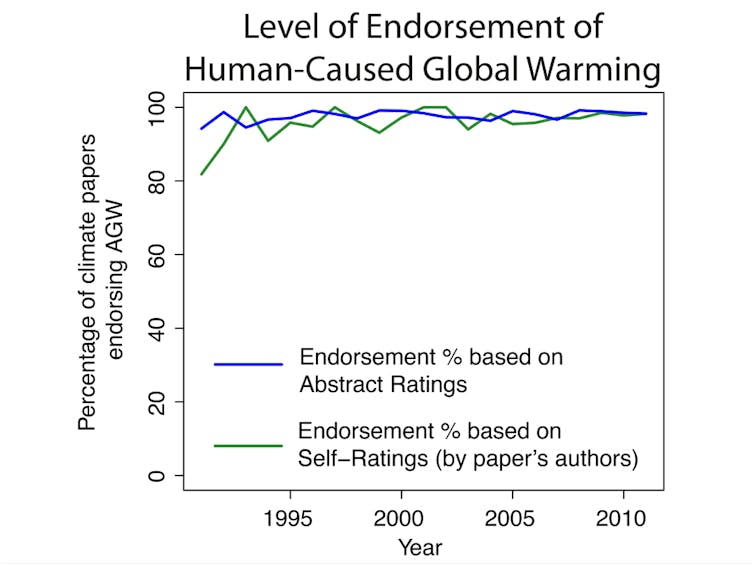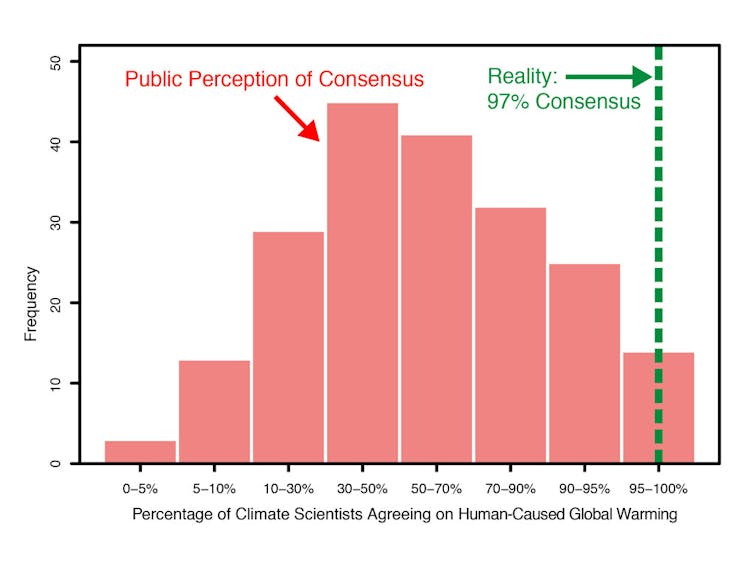Today, the most comprehensive analysis of peer-reviewed climate research to date was published in the journal Environmental Research Letters. Our analysis found that among papers expressing a position on human-caused global warming, over 97% endorsed the consensus position that humans are causing global warming. Overwhelming agreement among scientists had already formed in the early 1990s. And the consensus is getting stronger.
In a previous Conversation article, I argued that climate denial is essentially consensus denial. For over two decades, attacking the scientific consensus has been a central part of the movement to prevent meaningful climate action.
As early as 1991, Western Fuels Association spent $510,000 on a campaign to “reposition global warming as theory (not fact)”. Their strategy was to construct the impression of active scientific debate using dissenting scientists as spokesmen. This approach was concisely articulated in a memo to Republicans by political strategist Frank Luntz, leaked in 2002:
Voters believe that there is no consensus about global warming in the scientific community. Should the public come to believe that the scientific issues are settled, their views about global warming will change accordingly. Therefore, you need to continue to make the lack of scientific certainty a primary issue in the debate.
Using Skeptical Science’s taxonomy of climate myths, a recent analysis tracked climate misinformation published in opinion editorials from 2007 to 2010 by syndicated conservative columnists. The most popular myth was “there is no consensus”. More recently, a variation of the “no consensus” myth has emerged – the notion that the consensus is “on the verge of collapse”.
Our analysis examined the status of the scientific consensus over 21 years of published climate research, from 1991 to 2011. We searched for any papers matching the search “global warming” or “global climate change” in the Web of Science, a database of scientific peer-reviewed research. We rated the level of endorsement of human-caused global warming in each abstract, a short summary at the start of each paper.
In 2007, Naomi Oreskes predicted that as a consensus forms, fewer papers should explicitly endorse the consensus position. For example, you don’t expect to see geography research papers endorsing the fact that the earth is round. Our analysis confirmed this prediction, finding most abstracts didn’t state a position on whether humans were causing global warming.
However, we did identify over 4,000 abstracts that did state a position on human-caused global warming. Among those 4,000 abstracts, 97.1% endorsed the consensus. There was overwhelming agreement on human-caused global warming in every year since 1991.
To independently check our results, we also invited the thousands of scientists who authored the climate papers to rate the level of endorsement of their own papers. We received 1,200 responses with over 2,000 papers receiving a “self-rating”. Interestingly, most of the abstracts that we rated as “No Position” turned out to endorse the consensus in the full paper, according to the papers’ authors. Among all the papers that were self-rated as expressing a position on human-caused global warming, 97.2% endorsed the consensus.

Our results are strikingly consistent with other measurements of consensus. The seminal work on consensus was conducted by Naomi Oreskes who in 2004 analysed 928 climate papers. She found zero papers rejecting the consensus. We analysed the same papers as Oreskes and similarly found zero rejections in the papers matching her search parameters.
Two more recent studies have sought to measure the level of consensus in the scientific community. A survey of Earth scientists found that among actively publishing climate scientists, 97% agreed that humans were significantly changing global temperature. A compilation of scientists making public statements on climate change found that for the scientists who had published peer-reviewed climate research, there was 97% agreement.
While a number of studies have independently established overwhelming agreement among climate scientists, two decades of sustained attack on the consensus has been effective. There is a gaping chasm between the public perception and the actual 97% consensus. When a US representative sample was asked how many climate scientists agree that humans are causing global warming, the average answer was around 50%.

Why is climate denial synonymous with consensus denial? Social scientists are just starting to figure out what climate deniers have understood for decades. A 2011 study found that when people correctly understand that climate scientists agree, they are more likely to support policy to mitigate climate change. This is why a political operative hired by fossil fuel interests to undermine climate policy focused on attacking the consensus, arguing “If we win the science argument, it’s game, set, and match.”
This underscores the importance of correcting the mis-perception that scientists are still debating whether humans are causing global warming. An important step towards stronger public support for meaningful climate action is closing the consensus gap.
The results of the paper Quantifying the Consensus on Anthropogenic Global Warming in the Scientific Literature are summarised in a simple, user-friendly manner at theconsensusproject.com.

